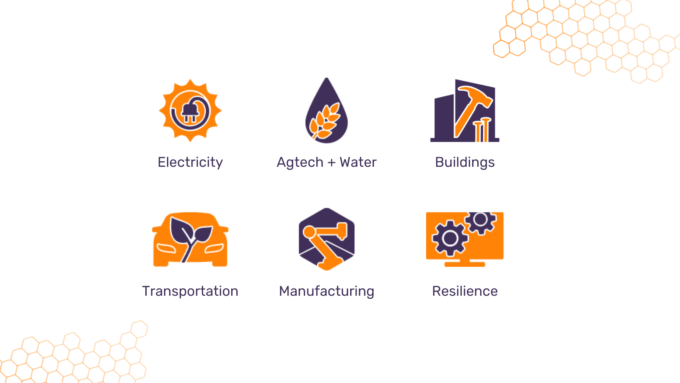Greentown Labs is the largest climatetech startup incubator in North America. But what is climatetech?
Some say it’s a buzzword, and fear a return to the cleantech bubble. But more than a decade later, the world is in a very different place. The 2018 IPCC report stated that we have the next 12 (now 10) years to radically change course—from the top to bottom of our economy—a mobilization on the scale and magnitude of WWII. In the U.S., the Green New Deal Resolution, the increased frequency of billion-dollar natural disasters, and worldwide youth activism have spurred dialogue on the urgency of addressing climate change like never before.
Climatetech is at the heart of this determined push for actionable climate solutions. Some organizations—including the founding Greentown startups and Greentown itself—grew out of the cleantech crash’s ashes and became part of a new generation of scrappier, capital efficient technology with the mission to address the world’s biggest energy and environmental challenges.
This new generation of cutting-edge technology is climatetech—technological solutions that mitigate the impacts of climate change and build resilient communities.
Mitigation technologies capture or reduce greenhouse gas (GHG) emissions. Examples include innovations in sustainable infrastructure in the buildings sector; renewables, energy storage, and grid infrastructure in the electricity sector; healthier food, reduced supply chain, and methane-reducing animal food in the agtech/water sector; circular economy in the manufacturing sector; electric vehicles in the transportation sector; and carbon capture processes including carbon capture, utilization, and storage.
Resilience technologies prepare people, communities, and infrastructure for the impacts of climate change, with a focus on equity. This category includes technologies that address environmental justice, such as sensors that detect pollution; technologies for use in natural disasters, such as sensors that detect flooding; DERs to provide electricity resiliency; heat-resistant crops; fireproof building materials; drones for mapping drought; and other technologies that help us understand or model climate data. Resilience’s emphasis on equity reflects the fact that solving climate change is about helping people as well as the planet—not only those who were part of creating the current resource inefficient and extractive paradigm, but most certainly, those who were not and disproportionately feel its impact.
While many of the technological solutions needed to address climate change exist, many more—both incremental and disruptive—are needed. Climatetech entrepreneurs are pushing the envelope here, both by improving and iterating on current technologies and by developing technologies the world has never seen (for a look at the latter, check out our member Power For Humanity).
For example, solar power can be made more efficient and become more widely adopted through new technologies, such as those of our companies Raptor Maps and Sistine Solar. EVs are increasingly available, but the infrastructure is still being developed, creating a need for startups—like our members SparkCharge—to create solutions to fill in the gap. Energy storage technology, such as what’s being developed by our recent graduate Form Energy, is still needed to address the intermittency of renewable resources. Still other companies are addressing climate equity, including our startup QuantAQ, which is addressing the challenges and opportunities in environmental justice through their work on sensing systems that can help us understand and mitigate the impacts of air pollution today. We also need new financial and business models to enable wider adoption of the existing technology, such as those implemented by our graduate Sunwealth.
Climatetech solutions represent massive opportunities and benefits for our society. While funding is key to these startups’ success, climatetech investments don’t rely on generosity. Research released several years ago by the World Bank estimated the opportunity for smaller climatetech firms at more than $1.6 trillion. That said, while job creation and profit are important drivers, climatetech entrepreneurs can make the argument that not only does their technology impact the climate, but it also has the potential to impact millions of people around the world. Who wouldn’t want to invest in the future of our children and grandchildren, who must live in this world long after we leave it? Not to mention those who live in neighborhoods where pollution from today’s energy sources impact their health and wellbeing right now.
Many in our industry have written about cleantech and climatetech, the differences and similarities. At Greentown, we believe the name “climatetech” helps us to center us on the problem we are all trying to solve—in all its dimensions. It focuses our efforts and attention. It is the technology we need to minimize the impacts of the changing climate on people, with an understanding that this involves not only mitigation, but resilience—across all communities. And unlike the descriptor “cleantech,” it does not make a value judgement about clean or dirty: it casts the challenge in a way that brings us all together to create our best future. It is time to move on from cleantech, to what must be our focus for the next decade, and beyond: climatetech.
With all of this in mind, Greentown’s mission is to get climatetech to scale so it can have an impact on people and the planet, in an equitable way. We do that through surrounding climatetech entrepreneurs with the community, network, and resources they need to succeed.
Meaningful climate action can create our best possible future—one where we all benefit from a sustainable, healthy climate and have equitable access to the amazing opportunities this transition offers—and climatetech is integral to this transformation. Each of us—from investors to corporates to policymakers to budding entrepreneurs—can play a role in enabling climatetech. We hope you’ll join us and learn more about how you can make an impact.
—
Emily Reichert is the previous CEO of Greentown Labs, the largest climatetech startup incubator in North America, on a mission to support entrepreneurs tackling the biggest climate and environmental challenges.

